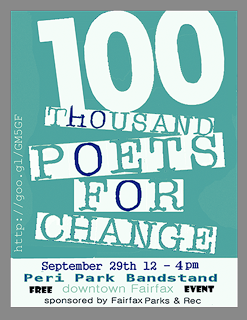Did life begin on Mars? Read this article about new evidence.
100 Thousand Poets for Change

September 28th in Fairfax, CA
The Canterbury Tales by Geoffrey Chaucer :A Retelling by Peter Ackroyd
Review by Harold Bloom from NY Times.com
Road Trip
Though many of us (Peter Ackroyd included) greatly would prefer common readers to learn just enough Middle English to begin enjoying Chaucer’s poetry in the original, that evades the way things are and the way they are going to be. Retelling Chaucer in our contemporary prose necessarily is a great loss, yet so rich is Chaucer that enormous value remains in Ackroyd’s robust versions of “The Canterbury Tales.”
THE CANTERBURY TALES
A Retelling
By Peter Ackroyd
Illustrated by Nick Bantock
436 pp. Viking. $35
Related
Times Topics: Peter Ackroyd
Geoffrey Chaucer (1343?-1400) by general and accurate consent is second only to Shakespeare among all writers in what is…
View original post 726 more words
The Canterbury Tales by Geoffrey Chaucer :A Retelling by Peter Ackroyd
Review by Harold Bloom from NY Times.com
Road Trip
- SIGN IN TO E-MAIL
Though many of us (Peter Ackroyd included) greatly would prefer common readers to learn just enough Middle English to begin enjoying Chaucer’s poetry in the original, that evades the way things are and the way they are going to be. Retelling Chaucer in our contemporary prose necessarily is a great loss, yet so rich is Chaucer that enormous value remains in Ackroyd’s robust versions of “The Canterbury Tales.”
THE CANTERBURY TALES
A Retelling
By Peter Ackroyd
Illustrated by Nick Bantock
436 pp. Viking. $35
Geoffrey Chaucer (1343?-1400) by general and accurate consent is second only to Shakespeare among all writers in what is now our language. Shakespeare’s uncanniest power, to create the illusion of human lives, owes much to the creator of the Wife of Bath, the Pardoner and their fellow pilgrims to Canterbury.
Born to a prosperous London family of wine merchants, Chaucer served three English kings as diplomat, customs controller and supervisor of royal residences. As a poet, he had royal patronage and depended upon Italian precursors, at first mediated for him by French translations, and later absorbed directly. Petrarch and Dante he acknowledged, frequently with irony, but he never once mentioned his older contemporary, Boccaccio, the overwhelming influence upon him. Without Boccaccio, no “Canterbury Tales”: that would be a fair judgment, though Chaucer is highly original in closely integrating his tales and their tellers, unlike Boccaccio.
Chaucer’s England was violent: usurpations, civil war and rape were prevalent. He himself had to make a legal settlement for a rape he evidently committed, and he suffered the experience of seeing friends and associates, with whom he had served Richard II, beheaded while he was spared.
As a poet, he clearly had a sense of his magnitude, though his pervasive irony masks it. French was still the language of the court, and Chaucer had chosen to write in the English vernacular. Much of his work is magnificent translation, and I think he would approve, however ironically, Ackroyd’s Chaucerian translation.
Ackroyd is a fiercely prolific novelist, biographer, general person of letters, sometimes reminding me of the equally industrious and similarly brilliant Anthony Burgess, whom I continue to miss personally.
Burgess, though, was at his best in some of his novels, particularly in his Joycean fiction about Shakespeare, “Nothing Like the Sun.” Ackroyd’s novels hold me, particularly his outrageous “Milton in America,” but his best work is in his marvelous cultural visions: “Albion,” “London,” “Thames.” I say “visions” because they convey a comprehensive and frequently dark sense of the English character and its vagaries, including sudden excursions into brutality and lawlessness. That darkly ironic sense is profoundly Chaucerian and suits the poet’s major work, the unfinished yet aesthetically complete “Canterbury Tales,” upon which he continued to work until his death at around 57. He contrasts in this with Shakespeare, who died at 52 and chose to write nothing during his three final years, while retired at Stratford-on-Avon.
Shakespeare’s greatest contemporary, the epic poet Edmund Spenser, derived directly from Chaucer, whom he praised as the “well of English undefiled.” That prompted the 18th-century poet-critic John Dryden to term Chaucer “a perpetual fountain of good sense.” Ackroyd’s Chaucer is a personified London and a humanized Thames, incessantly vital and comprehending everything it flows past.
Like Shakespeare’s plays, “The Canterbury Tales” convey a strong impression of the author’s detachment from his own creation. Chaucer the Pilgrim, a character in the “Tales,” is partly a parody of Dante the Pilgrim in the “Commedia” and partly an anticipation of Jonathan Swift’s Lemuel Gulliver and the Tale-Teller in “A Tale of a Tub.” As pilgrim, Chaucer professes admiration for every scoundrel he gathers together in his company of 28 wayfarers en route to Canterbury. Ackroyd catches the mode in which the pilgrimage is the 14th-century version of our West Indian cruises, erotic and recreational “wanderings by the way.”
The two grandest of Chaucer’s characters are Alice, the Wife of Bath, exuberantly erotic vitalist, and the Pardoner, perhaps a eunuch, a charlatan selling spurious religious relics and indulgences for sin. Chaucer’s gusto in imagining them is answered by Ackroyd’s own relish for the positive drive of the Wife of Bath and the negative intensity of the Pardoner.
Ackroyd is happiest and in his best form with Chaucer’s sublime ribaldry: the tales told by the Miller, the Reeve and the Summoner. Yet his own Catholic nostalgia lingers in a conviction that “The Canterbury Tales” “moves between piety and farce.” The farce is stronger than the faith in this secular masterpiece, which helped encourage Shakespeare to his own freedom from the sacred. Dante made Chaucer uncomfortable: I think the poet of the “The Canterbury Tales” would have rejoiced in Shakespeare.
Poster for 100 TPC Fairfax









